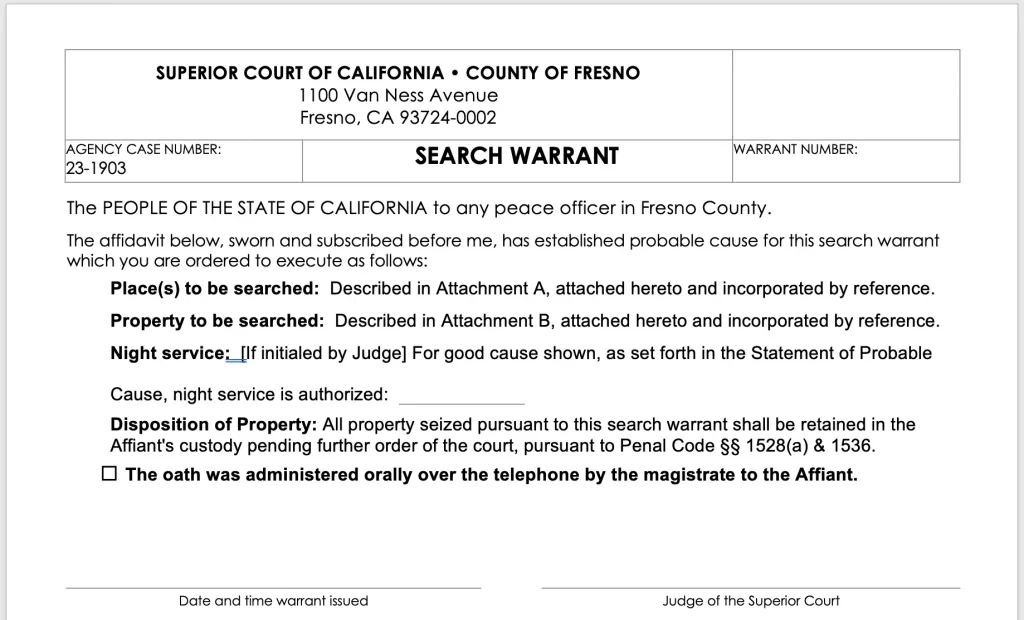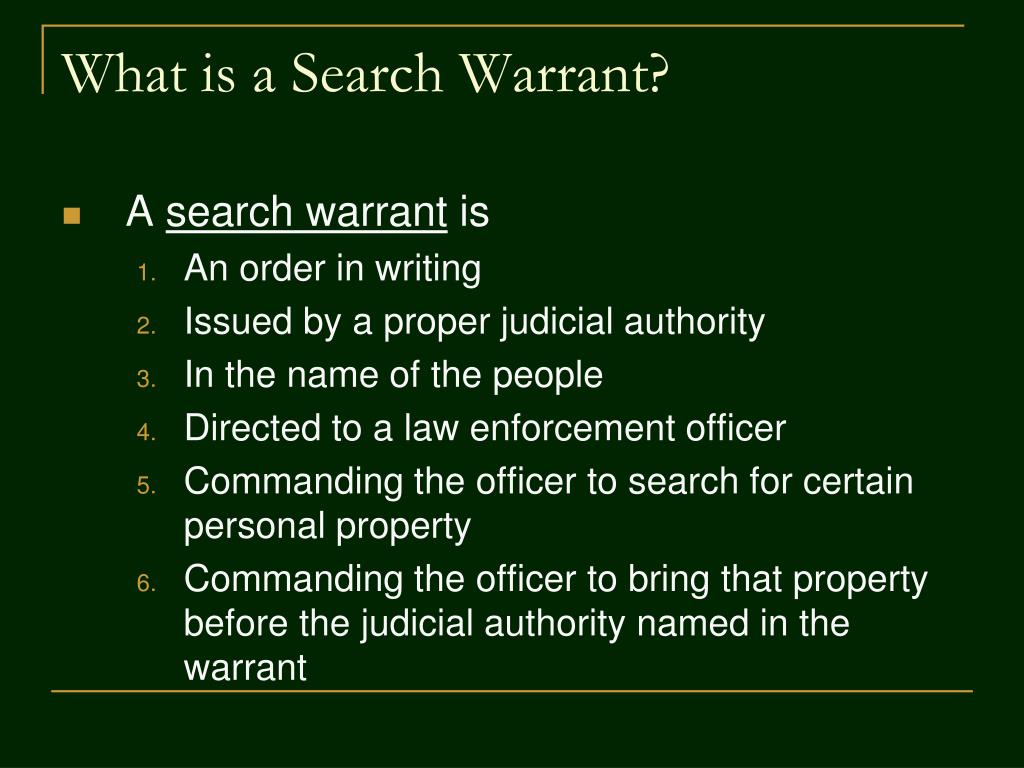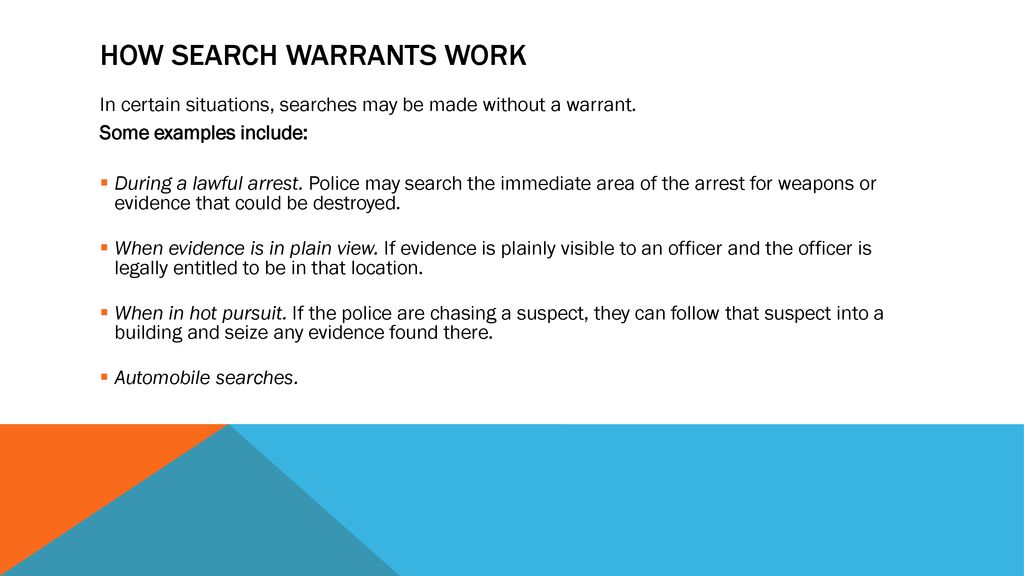How Do Search Warrants Work - To obtain a search warrant, an officer must prove to a magistrate or judge that probable cause exists for the proposed search, based upon. Learn about the 4th amendment, probable cause, particularity,. To obtain a search warrant, a law enforcement officer submits an affidavit to a judge or magistrate, detailing facts and. A search warrant is a document signed by a judicial officer or magistrate who is “neutral”—generally meaning not associated. A search warrant is a court order authorizing a search for criminal evidence. A search warrant is a document signed by a judge or magistrate that authorizes law enforcement officers to conduct a search of.
To obtain a search warrant, an officer must prove to a magistrate or judge that probable cause exists for the proposed search, based upon. Learn about the 4th amendment, probable cause, particularity,. To obtain a search warrant, a law enforcement officer submits an affidavit to a judge or magistrate, detailing facts and. A search warrant is a document signed by a judge or magistrate that authorizes law enforcement officers to conduct a search of. A search warrant is a document signed by a judicial officer or magistrate who is “neutral”—generally meaning not associated. A search warrant is a court order authorizing a search for criminal evidence.
A search warrant is a document signed by a judicial officer or magistrate who is “neutral”—generally meaning not associated. To obtain a search warrant, an officer must prove to a magistrate or judge that probable cause exists for the proposed search, based upon. A search warrant is a court order authorizing a search for criminal evidence. To obtain a search warrant, a law enforcement officer submits an affidavit to a judge or magistrate, detailing facts and. Learn about the 4th amendment, probable cause, particularity,. A search warrant is a document signed by a judge or magistrate that authorizes law enforcement officers to conduct a search of.
How Do Search Warrants Work?
Learn about the 4th amendment, probable cause, particularity,. A search warrant is a document signed by a judge or magistrate that authorizes law enforcement officers to conduct a search of. To obtain a search warrant, an officer must prove to a magistrate or judge that probable cause exists for the proposed search, based upon. To obtain a search warrant, a.
How to Write a Search Warrant Tips for Police Officers YouTube
A search warrant is a document signed by a judge or magistrate that authorizes law enforcement officers to conduct a search of. To obtain a search warrant, a law enforcement officer submits an affidavit to a judge or magistrate, detailing facts and. Learn about the 4th amendment, probable cause, particularity,. To obtain a search warrant, an officer must prove to.
Understanding Search Warrants About The Search Warrant Document Who Can
To obtain a search warrant, a law enforcement officer submits an affidavit to a judge or magistrate, detailing facts and. To obtain a search warrant, an officer must prove to a magistrate or judge that probable cause exists for the proposed search, based upon. Learn about the 4th amendment, probable cause, particularity,. A search warrant is a document signed by.
How Do Search Warrants Work? YouTube
A search warrant is a court order authorizing a search for criminal evidence. A search warrant is a document signed by a judicial officer or magistrate who is “neutral”—generally meaning not associated. To obtain a search warrant, a law enforcement officer submits an affidavit to a judge or magistrate, detailing facts and. A search warrant is a document signed by.
What is a Search Warrant and How Does it Work?
A search warrant is a court order authorizing a search for criminal evidence. Learn about the 4th amendment, probable cause, particularity,. To obtain a search warrant, a law enforcement officer submits an affidavit to a judge or magistrate, detailing facts and. To obtain a search warrant, an officer must prove to a magistrate or judge that probable cause exists for.
PPT Criminal Procedure for the Criminal Justice Professional 11 th
Learn about the 4th amendment, probable cause, particularity,. To obtain a search warrant, a law enforcement officer submits an affidavit to a judge or magistrate, detailing facts and. A search warrant is a document signed by a judge or magistrate that authorizes law enforcement officers to conduct a search of. To obtain a search warrant, an officer must prove to.
How To Find Arrest Warrants? YouTube
To obtain a search warrant, a law enforcement officer submits an affidavit to a judge or magistrate, detailing facts and. A search warrant is a document signed by a judicial officer or magistrate who is “neutral”—generally meaning not associated. A search warrant is a document signed by a judge or magistrate that authorizes law enforcement officers to conduct a search.
Understanding Basics Of The Search Warrant Process Apply For A Search
A search warrant is a document signed by a judge or magistrate that authorizes law enforcement officers to conduct a search of. A search warrant is a document signed by a judicial officer or magistrate who is “neutral”—generally meaning not associated. A search warrant is a court order authorizing a search for criminal evidence. To obtain a search warrant, an.
Understanding Search Warrants What They Are and How They Work The
A search warrant is a document signed by a judge or magistrate that authorizes law enforcement officers to conduct a search of. A search warrant is a document signed by a judicial officer or magistrate who is “neutral”—generally meaning not associated. Learn about the 4th amendment, probable cause, particularity,. A search warrant is a court order authorizing a search for.
Chapter 16 The Criminal Justice System ppt download
To obtain a search warrant, a law enforcement officer submits an affidavit to a judge or magistrate, detailing facts and. To obtain a search warrant, an officer must prove to a magistrate or judge that probable cause exists for the proposed search, based upon. A search warrant is a court order authorizing a search for criminal evidence. Learn about the.
Learn About The 4Th Amendment, Probable Cause, Particularity,.
A search warrant is a document signed by a judicial officer or magistrate who is “neutral”—generally meaning not associated. A search warrant is a court order authorizing a search for criminal evidence. To obtain a search warrant, a law enforcement officer submits an affidavit to a judge or magistrate, detailing facts and. A search warrant is a document signed by a judge or magistrate that authorizes law enforcement officers to conduct a search of.









